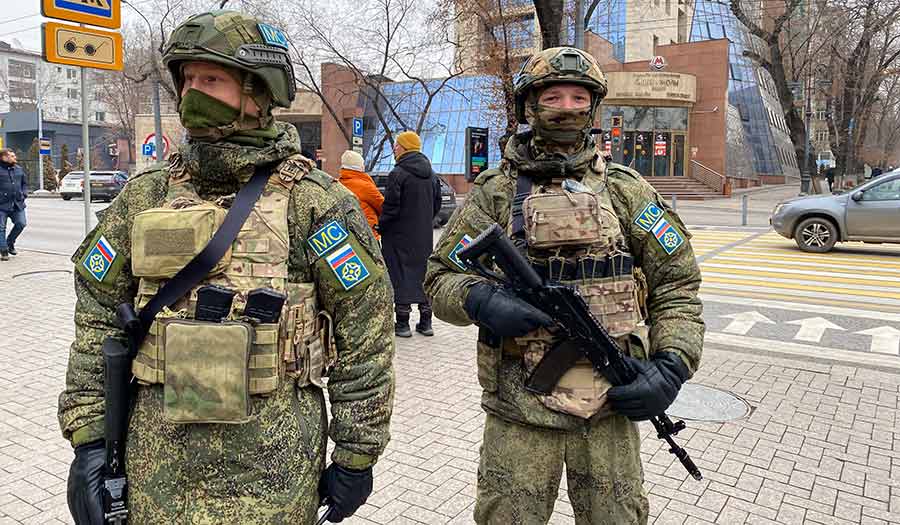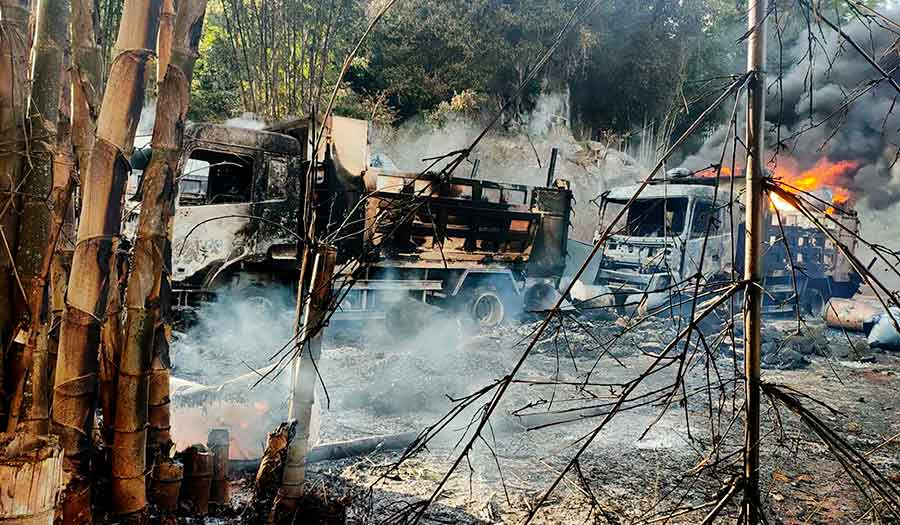 Russian Defense Ministry Press Service via AP
Russian Defense Ministry Press Service via AP
World News Desk
Learn the why behind the headlines.
Subscribe to the Real Truth for FREE news and analysis.
Subscribe NowMOSCOW (AP) – The president of Kazakhstan announced Tuesday that a Russia-led security alliance will start pulling out its troops from the Central Asian nation in two days after completing its mission.
The mostly Russian troops were deployed to Kazakhstan last week by the Collective Security Treaty Organization, a military alliance of six former Soviet states, at the president’s request amid the worst public unrest the former Soviet nation has faced since gaining independence 30 years ago.
Protests over soaring fuel prices erupted in the oil and gas-rich Central Asian nation of 19 million on January 2 and quickly spread across the country, with political slogans reflecting wider discontent over the country’s authoritarian government. Over the next few days, the demonstrations turned violent, with dozens of civilians and law enforcement officers killed.
In Almaty, Kazakhstan’s former capital and largest city, protesters set government buildings on fire and briefly seized the airport. The unrest was largely quelled by the weekend.
President Kassym-Jomart Tokayev has blamed the unrest on foreign-backed “terrorists” and insisted that his request for help to the CSTO was justified.
“When this decision was being made, we could have completely lost control over Almaty, which was being torn apart by terrorists. Had we lost Almaty, we would have lost the capital and the entire country,” Mr. Tokayev told Kazakhstan’s parliament Tuesday.
The president said the CSTO has largely completed its mission and will start withdrawing its troops in two days—a process that will take no longer than 10 days.
Asked whether such a move was premature—the troops only started arriving to Kazakhstan five days ago—Kremlin spokesman Dmitry Peskov said it was “utterly and completely” Kazakhstan’s prerogative. “It is their analysis, and we have no right to interfere,” Mr. Peskov said.
Tokayev also appointed a new prime minister and a new cabinet on Tuesday, with some deputy prime ministers and ministers from the previous government keeping their posts.
Kazakhstan’s government resigned last week in one of several concessions aimed at mollifying the protesters, along with a 180-day cap on fuel prices and the ouster of Nursultan Nazarbayev, the country’s former longtime leader, from his influential post of head of the National Security Council.
The new prime minister, 49-year-old Alikhan Smailov, previously served as Kazakhstan’s minister of finance and its first deputy prime minister.
Life in Almaty, which was hit by the harshest violence, started returning to normal this week, with public transport resuming operations and malls reopening. The owners of shops looted in the unrest were assessing the damage.
Galina Karpenko’s store was ransacked, and she said she lost about $10,000 in stolen goods and damage.
“This is not a small sum for me. It’s really not. I closed several outlets because of the crisis, as we couldn’t afford the rent. And now, my favorite outlet that was turning a profit and feeding my family took a hit,” she said. “I’m so distressed, God is my witness, I don’t know how to feed my kids.”
Kazakhstan’s Interior Ministry on Tuesday reported that 9,900 people were detained over the unrest. Tokayev’s office has also said 338 criminal probes into mass unrest and assaults on law enforcement officers have been opened.
- World News Desk
- ASIA
 Photos of Myanmar Massacre Aftermath Fuel Outrage
Photos of Myanmar Massacre Aftermath Fuel Outrage
Other Related Items:
- North Korea Holds Key Conference as Kim Jong Un Marks 10 Years in Power
- Thousands of Cranes Killed by Bird Flu in Northern Israel
- ‘So Many Memories’: Nearly 1,000 Homes Destroyed by Colorado Fire


